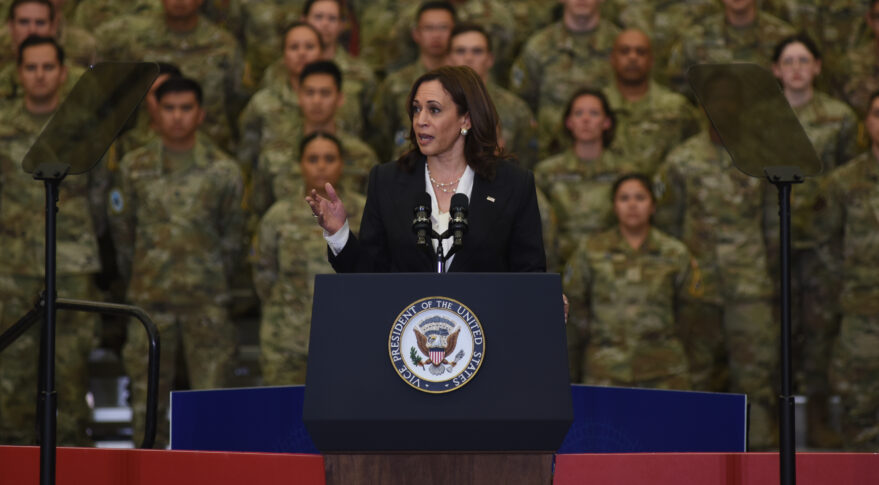
WASHINGTON — A State Department official said the Biden administration’s announcement of a ban of one kind of antisatellite (ASAT) weapon tests was timed to support discussions at an upcoming United Nations forum on norms of behavior in space.
Vice President Kamala Harris announced April 18 that the United States would ban tests of destructive direct-ascent ASATs because of the large amounts of debris they create. “These tests are dangerous and we will not conduct them,” she said in a speech at Vandenberg Space Force Base in California.
Harris didn’t explain in her speech why the U.S. was enacting this ban now, with no public plans by the U.S. military to perform such tests. However, at an April 21 webinar by the British American Security Information Council (BASIC), Eric Desautels, acting assistant deputy of state for arms control, verification and compliance, linked the announcement to an upcoming U.N. meeting, formally known as an Open-Ended Working Group (OEWG), to discuss norms of behavior for reducing space threats.
“The timing of our announcement by the vice president on Monday is meant to spur a meaningful discussion in the Open-Ended Working Group, as we view this as an important tool in our efforts to multilateralize this commitment,” he said.
“Having our own proposal at the OEWG of a norm of responsible behavior will allow the United States to demonstrate our leadership in this area and to drive a conversation in a way that supports our position and doesn’t undermine U.S. and allied security in the face of what surely will be competing proposals,” he added.
The meeting, scheduled for the week of May 9 in Geneva, is the first of four scheduled over two years to discuss norms, rules and principles of responsible behaviors in space, a process created by a resolution approved late last year by the U.N. General Assembly. The initial meeting was scheduled for February but postponed at the request of the Russian government, which said at the time it was not prepared to start discussions.
The U.S. ban has won support from several allies but also skepticism from China, which has been advocating, with Russia, for a treaty banning the placement of weapons in space for more than a decade. That treaty, notably, would not ban direct-ascent ASATs like the one Russia demonstrated in November 2021.
A panel of experts at the BASIC webinar welcomed the announcement of the ban as a positive step for space security and for discussions at the OEWG. “We’re starting to see a gelling of responses in terms of what’s identified as responsible behavior,” said Victoria Samson, Washington office director of the Secure World Foundation, citing the ban as well as a set of tenets of responsible space behavior released by the Defense Department in July 2021, which includes limiting the creation of long-lived space debris.
“Hopefully, with the U.S. announcement, this may give some shape and some consideration, and give the delegates a starting point for discussion” at the OEWG, she said. “Whether or not there is consensus out of the OEWG, I think it’s very helpful to have these discussions to get the international community on the same page for what they see as responsible behavior.”
“The test ban moratorium from the United States is a good move, but it is a quite a modest move as well,” said Bleddyn Bowen of the University of Leicester. While Desautels emphasized the role of U.S. leadership in the U.N. discussions, Bowen warned that could go too far, citing the experience with the failed “code of conduct” for outer space activities promulgated by the European Union last decade, which failed to gain widespread support.
“A challenge for everyone involved in the process is to try to keep it inclusive and multilateral as much as possible,” he said. “Phrases like ‘U.S. leadership’ has to be quite carefully managed because it is meant to be a multilateral effort.”
Desautels said the ASAT test ban is not the only issue the United States plans to bring up at the OEWG. “We think the OEWG is an excellent forum for developing concepts for addressing some of these other threats, given some of the challenges in attribution and definition,” he said. That includes enhancing communications, best practices for “safe and professional operations” of national security satellites to avoid collisions and harmful interference, and avoiding “purposeful interference” with satellite command and control systems.
Another issue, he said, is “to ensure that the work of the Open-Ended Working Group does not in any way restrict the peaceful uses of outer space technology by developing countries.”
